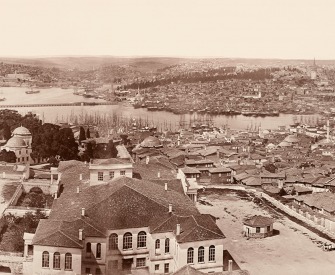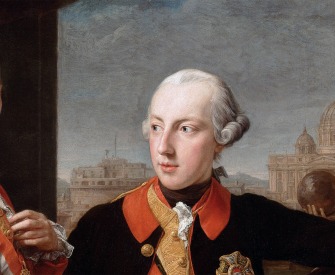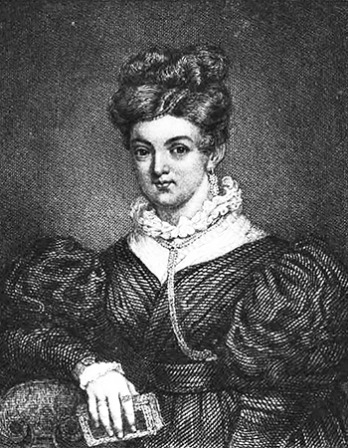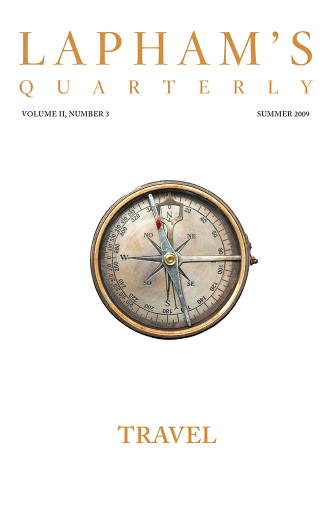We had brought dough tied in a cloth, to spare our water; it had been kneaded at Al-Hijr. Of this dough, one made large flat cakes (abûd) which, raked under the red-hot sand and embers of our hearth, are after a few minutes to be turned. Our bread taken up half-baked was crumbled with dates in the hollow of a skin pressed in the sand troughwise, with a little water, that we might feel the less need to drink and make not too soon an end of our little girby, being five persons. The nomads in this country after dates rub their palms in sand; some ruder choughs wipe the cloyed fingers in their long elf locks. The bright night shone about us very cold, and half-numbed we could not sleep; before morning I found but 38 degrees Fahrenheit. We rose from our rocky beds after midnight with aching bones to make up the watchfire. We broke our fast ere day of that which remained and each had a draft of water. Then taking up their long guns, they went to stalk the bedûn, or great wild goats of the mountain. I stayed by the water skin in the way by which we should return, while they climbed among the waste rocks. Until noon, only Wady, one of the Bedouins, had fired at a running buck and missed him, as the Bedouins will nine times in ten. As we went now homeward, a troop startled before us of ten bedûn and sprang upon the rocky shelves: our gunners went creeping after for an hour, but the quarry was gone from them.
One day our hunters brought in a porcupine, nîs, they find his earth like a rabbit burrow and with a stick knock him on the head. An equal portion of this (the Arabs’ religious goodness) was divided to all in the kella. The porcupine is not flayed, the gelatinous skin may be eaten with the flesh, which has a fishy odor. They boiled the meat, and everyone after supper complained of heartburning, I only felt nothing. It is also the Arabs’ fable that the creature can shoot out his pricks against an enemy. The goat, the ass, the porcupine, will eat greedily of the colocynth gourd, which to human nature is of so mortal bitterness that little indeed and even the leaf is a most vehement purgative; they say it will leave a man half dead, and he may only recover his strength by eating flesh meat. Some Bedouin brought us in a great ostrich egg, which dressed with samn and flour in a pan, savored as a well-tasting omelette. The ostrich descends into the plain of Mada’in Saleh; I have seen her footing in Ethlib. Doolan, as many of his Heteym nation, was an ostrich hunter; in the season he mounted upon his thelûl and riding at adventure in the wilderness, if God would he found an ostrich path, there he hid himself, awaiting, all day, with lighted match, till the bird should pass: but this patience is many times disappointed save when the nest is found. Once he had brought home two ostrich chicks, which grew up in the kella, but one day the young birds fed on beans, and these swelling in their crops had choked them. So poor was the man, he found not every day to eat, yet were his hunter’s tools of the best; his matchlock was worth more than other in that desert side, namely forty riyals. Doolan had most years his two skins ready against the hajj, in which is wont to come down a certain Damascus feather merchant, who buys all ostrich skins from the nomads by the pilgrim road, paying for every one forty to forty-five riyals. The ostrich feeds, pasturing from bush to bush, “like the camel.” The hunters eat the bird’s breast, which is dry meat; the fat is precious, one of their small coffee cups full is valued at half a mejîdy; they think it a sovereign remedy for heat and cold, and in many diseases.
From Travels In Arabia Deserta. Born in 1843 and orphaned by the age of six, Doughty studied geology at Cambridge University and early English literature at Oxford’s Bodleian Library. He embarked upon the hajj with a caravan of Muslims in 1876, becoming the first European to travel so widely in the Arab world. Doughty published this book in 1888, his archaic style limiting its sales. T. E. Lawrence in 1922 helped arrange for the author to receive a Civil List pension.
Back to Issue





